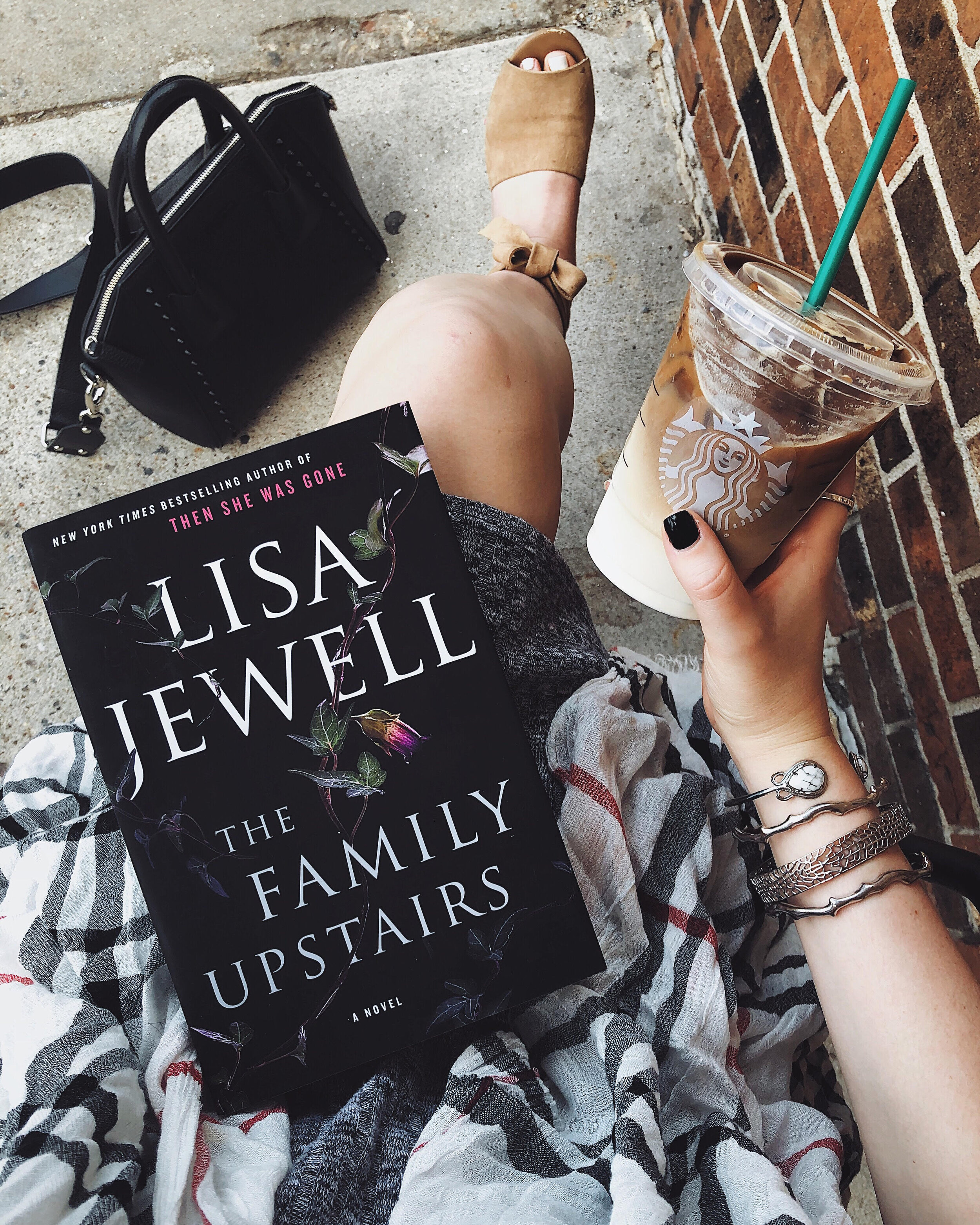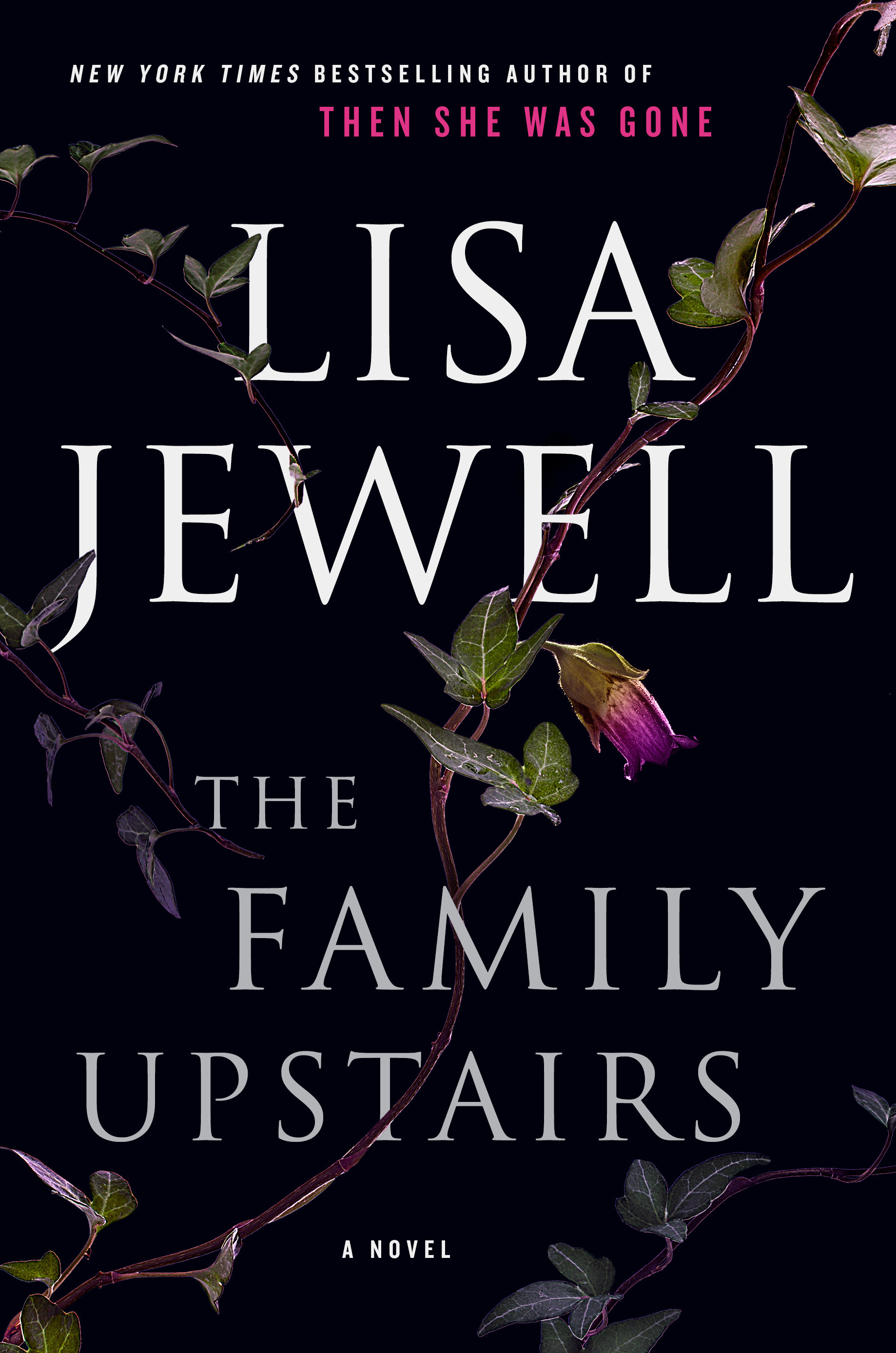Author Q&A: Lisa Jewell
THE FAMILY UPSTAIRS
I’m a self-confessed latecomer to Lisa Jewell’s work, and I’ll be the first to admit it: I’ve been missing out. I devoured Jewell’s newest release THE FAMILY UPSTAIRS earlier this fall, and there’s no going back—I’m a Lisa Jewell fan for life. Jewell is the author of seventeen internationally bestselling novels, and her newest release, THE FAMILY UPSTAIRS, debuted on the New York Times bestsellers list. All of this is to say: Lisa Jewell really needs no introduction, but on the off chance that you, too, are a latecomer to Jewell and her binge-worthy brand of psychological suspense, allow this blog post to serve as your point of entry into this prolific author’s work. I’m absolutely thrilled to welcome Lisa Jewell to Crime by the Book today to discuss her newest release, THE FAMILY UPSTAIRS. In this twisty, dark story of psychological suspense, a young woman inherits her birth parents’ abandoned mansion in a posh London neighborhood—and inherits a dark legacy, too. Years earlier, that mansion was the site of a bizarre - and unsolved - tragedy, involving the deaths of the home’s adult residents, and the disappearance of children who were thought to be living at the house at the time, too. Using multiple narrators and shifting timelines to pitch-perfect effect, Jewell crafts an utterly addictive and engrossing story of family secrets in THE FAMILY UPSTAIRS. If you’re looking for a fresh take on a domestic suspense novel, this book might just be your perfect fit.
I’m so excited to share my Q&A with Lisa Jewell on her newest release with you today! Many thanks to Lisa for taking the time to answer my questions so thoughtfully, and to her fantastic US publicist for facilitating this conversation. Read on for more information about THE FAMILY UPSTAIRS, a direct link to my full review of the book, and, of course, my Q&A with Lisa Jewell.
This post contains Amazon Affiliate links. CBTB may earn a small commission for items ordered through these links. All opinions my own.
THE FAMILY UPSTAIRS by Lisa Jewell
About the Book:
From the New York Times bestselling author of Then She Was Gone comes another page-turning look inside one family’s past as buried secrets threaten to come to light.
Be careful who you let in.
Soon after her twenty-fifth birthday, Libby Jones returns home from work to find the letter she’s been waiting for her entire life. She rips it open with one driving thought: I am finally going to know who I am.
She soon learns not only the identity of her birth parents, but also that she is the sole inheritor of their abandoned mansion on the banks of the Thames in London’s fashionable Chelsea neighborhood, worth millions. Everything in Libby’s life is about to change. But what she can’t possibly know is that others have been waiting for this day as well—and she is on a collision course to meet them.
Twenty-five years ago, police were called to 16 Cheyne Walk with reports of a baby crying. When they arrived, they found a healthy ten-month-old happily cooing in her crib in the bedroom. Downstairs in the kitchen lay three dead bodies, all dressed in black, next to a hastily scrawled note. And the four other children reported to live at Cheyne Walk were gone.
In The Family Upstairs, the master of “bone-chilling suspense” (People) brings us the can’t-look-away story of three entangled families living in a house with the darkest of secrets.
From CBTB’s Review:
Some family secrets should never see the light of day. In Lisa Jewell’s thrilling, addictive new release, a surprise inheritance sends a young woman on a journey into her own personal history—and what she discovers might be deadly. Libby Jones always dreamed of learning more about her origins. One day, not long after turning 25, Libby comes home to find an envelope waiting for her, its contents revealing the true identity of her birth parents… and the fact that she has inherited their vast mansion in a posh London neighborhood. Libby’s life suddenly seems to be changing for the better. But by claiming this inheritance, Libby is claiming a darker inheritance, too: a connection to an unsolved crime and an obscure, cult-like society, one which has been waiting, biding its time, until Libby makes herself known. THE FAMILY UPSTAIRS is a fresh, inventive take on domestic suspense; effortlessly traversing intimate family secrets and vast, far-reaching conspiracies, Lisa Jewell’s newest release is a masterclass in psychological thriller plotting. Come for this book’s gorgeous cover and twisty plot, stay for its genuinely surprising and original variations on a story of family secrets and interpersonal suspense. An excellent new release and a standout among 2019’s psychological thriller offerings. | Read the Full Review
Author Q&A: Lisa Jewell
THE FAMILY UPSTAIRS
Crime by the Book: Thank you so much for stopping by Crime by the Book to give us the inside scoop on your newest release! Can you identify one particular moment that sparked the inspiration for The Family Upstairs?
Lisa Jewell: I certainly can; I saw a woman when I was on holiday in the South of France two summers ago, pulling her small children into the private shower block of a beach club where I was having lunch with my family. She was looking quite furtive and anxious and I assumed that she probably was not a member of the beach club. It was just a fleeting glimpse but for some reason she got stuck in my head. I kept thinking about her and over the following days and weeks, I began embellishing the bare bones of what I’d seen; I pictured her busking on the streets of Nice, escaping from London as a child after some terrible trauma, I even pictured her as a young girl running barefoot through the streets of Chelsea in the middle of the night. Essentially, I wrote the story for her. In the book her name is Lucy.
CBTB: The Family Upstairs is a deliciously complex story, and I want to touch on as much of it as we can in this Q&A, but let's start at the very beginning: with the character of Libby Jones. Who is Libby, and how would you describe her to someone meeting her for the first time?
LJ: I would describe Libby as an ‘every girl’, she’s very measured and cautious, she hasn’t had a wild youth dating unsuitable men and spending all her money on throwaway fashion and nights out; she’s stayed in and saved and bought an apartment and worked her way up the ladder of the kitchen company where she works to become a sales director at the age of twenty-five. She dresses conservatively for a young millennial; no piercings, no tattoos no rainbow hair. In a world in which many people defer growing up to some random point in their thirties, she’s already there.
CBTB: I love how you've crafted Libby's character. In the midst of the wild twists her life takes over the course of the book, she always felt completely authentic and grounded to me. Could you speak to how you developed Libby's character? Did she present herself to you as a fully-crafted person from the outset, or did she take any unexpected turns over the course of the book?
LJ: I wouldn’t say she took any unexpected turns, as her role in the book was always to play the detective and solve the mystery of what happened in the house where she was born twenty-five years earlier. But I did find myself halfway into the book feeling that I hadn’t layered her enough, that I had given her a bare pencil outline in the first few chapters and then not really grown with her. There was so much going on with my other two characters and Libby was so busy solving puzzles that I’d left her a bit untethered. So there are some moments later in the book when I throw a bit of back story at her and we find out a bit more about her childhood and why she has turned into such a self-controlled and ambitious young woman.
CBTB: We've also got to touch on Lucy, another prominent character in The Family Upstairs. Lucy's life seems somehow tied to Libby's, and readers will be riveted to watch how the lives of these two women converge over the course of the book. Could you give us a brief introduction to Lucy, and to her thread of this story?
LJ: Lucy, the character inspired by the lady in the south of France, is almost forty, has a twelve year old son called Marco and a five year old daughter called Stella and when we meet her, she and her children and a Jack Russell called Fitz are living rough on the hot summer streets of Nice, in the south of France. Lucy has been supporting her small family by busking with her violin, but her violin is broken, and she can’t afford to get it fixed. In the first scene, she is feeding her children using the last euros from the bottom of her bag and facing a night sleeping out in the open. And then her phone buzzes and she looks at it and it is a notification from her calendar that says, simply, ‘the baby is 25.’ Lucy quickly becomes desperate to get to London after seeing this message for reasons that become apparent as the story unfolds.
CBTB: There's something so irresistible about a mysterious inheritance; they are staples of so many crime novels, old and new. In your opinion, what makes this concept - an inheritance as a protagonist's entry point into a long-hidden mystery - such a compelling springboard for a suspense novel?
LJ: I think it’s something to do with dusty paperwork and locked boxes and old keys and all the ephemera of a mystery left in stasis that is suddenly being unpacked when the inheritance is revealed. It’s not enough to know that you’ve inherited an old book with intriguing scribbles in the margins, or a house in Chelsea with a strange news story attached to it; you can’t accept the inheritance without understanding what it really represents.
CBTB: The more Libby learns about her own personal history, and the history of the home she has inherited, the more this story opens up and expands. It comes to encompass elements of international intrigue, dark family secrets, and a whole lot more. Did one thread of the story present itself to you first? And how did you figure out that all of these disparate threads belonged together in the same story?
LJ: It was less that one thread presented itself to me first than a snowballing of ideas after that initial glimpse of the woman in the south of France. Everything came back to that woman; the image of her as a child running barefoot through Chelsea, the idea of the house she was escaping still standing there, empty and waiting to be unlocked. It was as much of a mystery to me as to the reader what those secrets might be until I broke into Henry’s voice and he started to retell the story.
CBTB: The most insidious and fascinating element of this story for me was its exploration of group mentality, and how individuals can quite easily be swept up in a situation that, from an outsider's perspective, is totally shocking and unhealthy. Why incorporate an element of cult-like behavior into your psychological thriller? What interested you about this sort of group dynamic?
LJ: When I knew I needed a childhood trauma at the root of this book, I thought for some time about what it might have been, and I had this recurring image of children being locked to their beds at the very top of a grand Chelsea house far away from the sparkling chandeliers and polished mahogany in the lower rooms. I wasn’t sure why the children were locked to their beds, I needed Henry to tell me that, and I slowly introduced more and more characters into the house -- getting a feel for them all and how they might affect the dynamics of the Lamb family. And then David Thomsen walked in and I just knew who he was and what he was going to do.
CBTB: The Family Upstairs employs alternating narrators and multiple timelines to craft a complex story that hangs together seamlessly. What kind of plotting and planning goes into writing an intricate thriller like this? (For example, do you write from an outline?)
LJ: No, I never make notes before I start writing. I carry a load of ideas around in my head for quite some time before I start writing, hoping that by the time I type ‘chapter one’ that they will have grown and gelled together into something I can start working with. Then I just plot as I go, either directly on the page using the randomness that lives inside my head as it appears to me, or often in the shower, where I think about what might happen over the next chapter or two. But often l write without knowing even that far ahead what’s going to happen, so I just write whatever comes to me and then find a way to make it work later.
CBTB: What are you working on next?
LJ: I’m nearing the end of my 18th novel. I can’t really tell you too much about it apart from the fact that it is very different to The Family Upstairs; no dual time frame, all set in one location etc. But I can tell you that the working title is The Invisible Girl and will be published in the US in early November 2020.
Huge thanks to Lisa Jewell for stopping by CBTB to give us this fantastic inside glimpse into her newest release! THE FAMILY UPSTAIRS is now available at your favorite bookseller.
Book Details:
Hardcover: 352 pages
Publisher: Atria Books (November 5, 2019)
Language: English
ISBN-10: 1501190105
ISBN-13: 978-1501190100
Crime by the Book is a participant in the Amazon Services LLC Associates Program, an affiliate advertising program designed to provide a means for sites to earn advertising fees by advertising and linking to Amazon.com. This in no way affects my opinion of the book(s) included in this post.













Home ownership feel like a distant dream? Zillow listings have you convinced you’ll be renting for the rest of your life? The woman at the heart of Carissa Orlando’s debut The September House feels your pain—and she’s prepared to put up with a lot if it means she and her husband can finally have a place to call their own. In this case, that might just mean living in a house that’s haunted. Playful and irreverent, spine-tingling and spooky, The September House puts a fresh spin on the classic haunted house story, delivering an immersive tale about the secrets lurking within one building’s walls, and within the lives of its inhabitants.